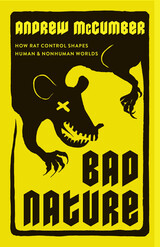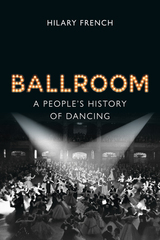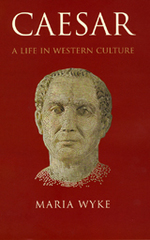
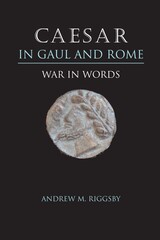
Winner, AAP/PSP Award for Excellence, Classics and Ancient History, 2006
Anyone who has even a passing acquaintance with Latin knows "Gallia est omnis divisa in partes tres" ("All Gaul is divided into three parts"), the opening line of De Bello Gallico, Julius Caesar's famous commentary on his campaigns against the Gauls in the 50s BC. But what did Caesar intend to accomplish by writing and publishing his commentaries, how did he go about it, and what potentially unforeseen consequences did his writing have? These are the questions that Andrew Riggsby pursues in this fresh interpretation of one of the masterworks of Latin prose.
Riggsby uses contemporary literary methods to examine the historical impact that the commentaries had on the Roman reading public. In the first part of his study, Riggsby considers how Caesar defined Roman identity and its relationship to non-Roman others. He shows how Caesar opens up a possible vision of the political future in which the distinction between Roman and non-Roman becomes less important because of their joint submission to a Caesar-like leader. In the second part, Riggsby analyzes Caesar's political self-fashioning and the potential effects of his writing and publishing the Gallic War. He reveals how Caesar presents himself as a subtly new kind of Roman general who deserves credit not only for his own virtues, but for those of his soldiers as well. Riggsby uses case studies of key topics (spatial representation, ethnography, virtus and technology, genre, and the just war), augmented by more synthetic discussions that bring in evidence from other Roman and Greek texts, to offer a broad picture of the themes of national identity and Caesar's self-presentation.
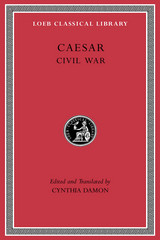
The struggle that ended the Roman Republic.
Caesar (C. Iulius, 102–44 BC), statesman and soldier, defied the dictator Sulla; served in the Mithridatic wars and in Spain; entered Roman politics as a “democrat” against the senatorial government; was the real leader of the coalition with Pompey and Crassus; conquered all Gaul for Rome; attacked Britain twice; was forced into civil war; became master of the Roman world; and achieved wide-reaching reforms until his murder. We have his books of commentarii (notes): eight on his wars in Gaul from 58–52 BC, including the two expeditions to Britain in 55–54, and three on the civil war of 49–48. They are records of his own campaigns (with occasional digressions) in vigorous, direct, clear, unemotional style and in the third person, the account of the civil war being somewhat more impassioned.
This edition of the Civil War replaces the earlier Loeb Classical Library edition by A. G. Peskett (1914) with new text, translation, introduction, and bibliography. In the Loeb Classical Library edition of Caesar, Volume I is his Gallic War; Volume III consists of Alexandrian War, African War, and Spanish War, commonly ascribed to Caesar by our manuscripts but of uncertain authorship.

Why did Caesar have to die--and why did his death solve nothing? The plot was confused, the execution bungled, and within hours different versions of the event were circulating. It was the end of republican Rome and the beginning of the Roman Empire--and yet everything about it remains somewhat mysterious.
Beginning with this legendary political assassination, immortalized in art and literature through the ages, Greg Woolf delivers a remarkable meditation on Caesar's murder as it echoes down the corridors of history, affecting notions and acts of political violence to our day.
Assassins Brutus and Cassius dined with their fiercest enemies within days of the murder--and were then hunted down and killed. After the murder neither conspirators nor Caesar's partisans knew how to react. From these beginnings this book follows the normalization of assassination at Rome, cataloguing the murder of Caesar after Caesar and recording the means, methods, and motives of the perpetrators. How was the Roman Empire so untouched by these events? And how had the Republic contained such violence between friends for so long? Woolf shows how Caesar's death--and the puzzled reactions to it--points back to older ethics of tyrannicide.
When is it justified to kill a head of state? Does extra-judicial execution provide answers worth the cost of the ensuing chaos? Ranging among texts by Cicero, Suetonius, and Seneca, plays by Shakespeare and Corneille, and the ideas of Michel Foucault and Francis Fukuyama, Woolf pursues these questions through the ages. His book tells us not only how, but why, Caesar's Vast Ghost still holds us spellbound.
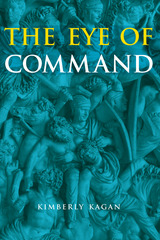
Challenging Keegan's seminal work, The Eye of Command offers a new approach to studying and narrating battles, based upon an analysis of the works of the Roman military authors Julius Caesar and Ammianus Marcellinus. Kimberly Kagan argues that historians cannot explain a battle's outcome solely on the basis of soldiers' accounts of small-unit actions. A commander's view, exemplified in Caesar's narratives, helps explain the significance of a battle's major events, how they relate to one another and how they lead to a battle's outcome. The "eye of command" approach also answers fundamental questions about the way commanders perceive battles as they fight them-questions modern military historians have largely ignored.
"The Eye of Command is a remarkable book-smart, thoughtful, clear, vigorous, factual but creative, and grounded in the practical. It is at once scholarly and readable, combining classical scholarship and military theory. Rarely have I come across a book that makes two-thousand-year-old events seem so alive."
-Barry Strauss, Professor of History, Cornell University
"In a work well written, concisely presented, and convincingly argued, Kagan uses examples from Caesar's Gallic Wars to challenge John Keegan's focus on lower-echelon experiences of battle in favor of 'The eye of command': a narrative technique emphasizing decisions and events that shape a battle's outcome."
-Dennis Showalter, Professor of History, Colorado College
"To know whether a battle is won or lost is not enough. Kagan's deep analysis of theory and practice points to a new way of understanding complex army-commander and small-unit perspectives that can properly claim the status of history."
-Gordon Williams, Thacher Professor of Latin Emeritus, Yale University
Kimberly Kagan was an Assistant Professor of History at the United States Military Academy between 2000 and 2005. Since then, she has served as a lecturer in International Affairs, History, and the Humanities at Yale University and as an adjunct professor at Georgetown's Edmund A. Walsh School of Foreign Service and at American University's Department of History. She received her Ph.D. in Ancient History from Yale University.
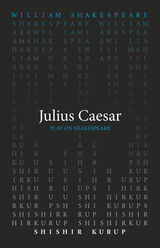
Julius Caesar, Shakespeare’s famous Roman tragedy, chronicles the chaos leading up to the fateful murder of Caesar and the ensuing political fallout upon his death. Shishir Kurup’s translation updates Shakespeare’s language to allow more of the playwright’s ideas to come through; it opens the wonders and blazing relevance of the play’s rhetorical brilliance to the twenty-first century.
This translation of Julius Caesar was written as part of the Oregon Shakespeare Festival’s Play On! project, which commissioned new translations of thirty-nine Shakespeare plays. These translations present the work of “The Bard” in language accessible to modern audiences while never losing the beauty of Shakespeare’s verse. Enlisting the talents of a diverse group of contemporary playwrights, screenwriters, and dramaturges from diverse backgrounds, this project reenvisions Shakespeare for the twenty-first century. These volumes make these works available for the first time in print—a new First Folio for a new era.

The first complete English translation of a controversial Renaissance debate centering moral questions on power and leadership.
Poggio Bracciolini was a prominent scholar-official of the early Renaissance and a leading representative of Florentine humanism. He was employed as a secretary to seven popes and ended his career as Chancellor of the Republic of Florence. On Leaders and Tyrants contains texts, the majority by Poggio, relating to a controversy on the relative merits of the lives and deeds of Scipio Africanus and Julius Caesar. The debate addressed the nature of tyranny and military glory, as well as the qualities necessary for republican leaders, such as Stoic virtue, lawfulness, and good citizenship. Poggio’s primary opponent was the educator Guarino of Verona, a humanist in the service of the duke of Ferrara. The psychology of power, the demands placed on public servants, and the dividing line between leadership and tyranny are as topical today as they were when Poggio wrote. This volume contains a fresh edition of the Latin texts and the first complete translation of the controversy into English.
READERS
Browse our collection.
PUBLISHERS
See BiblioVault's publisher services.
STUDENT SERVICES
Files for college accessibility offices.
UChicago Accessibility Resources
home | accessibility | search | about | contact us
BiblioVault ® 2001 - 2025
The University of Chicago Press





